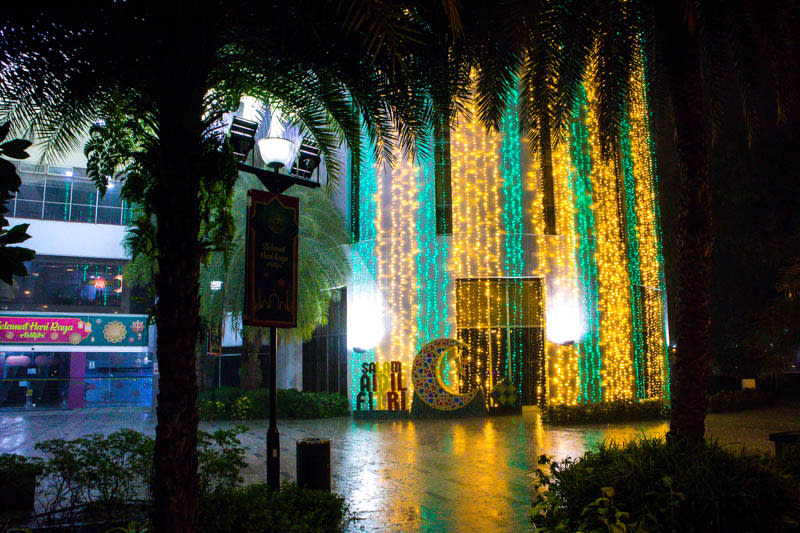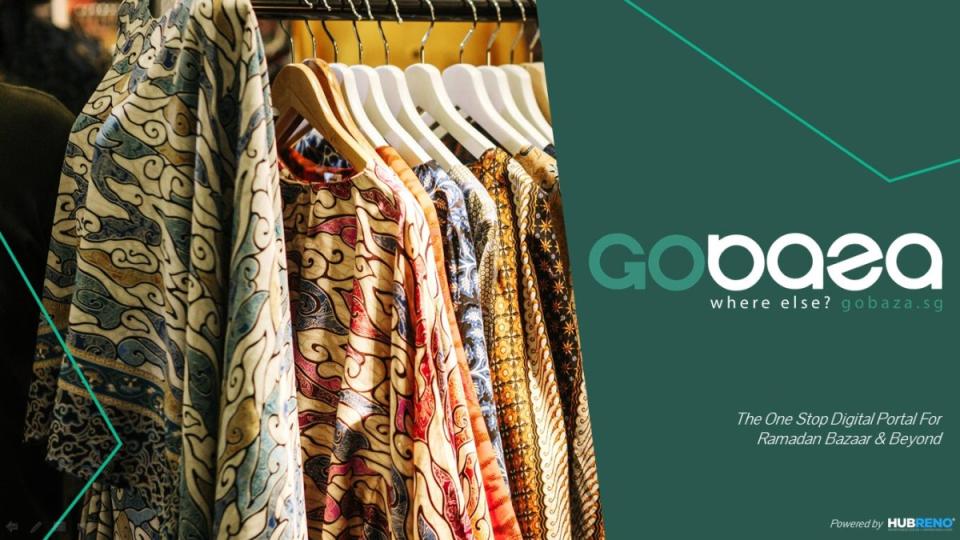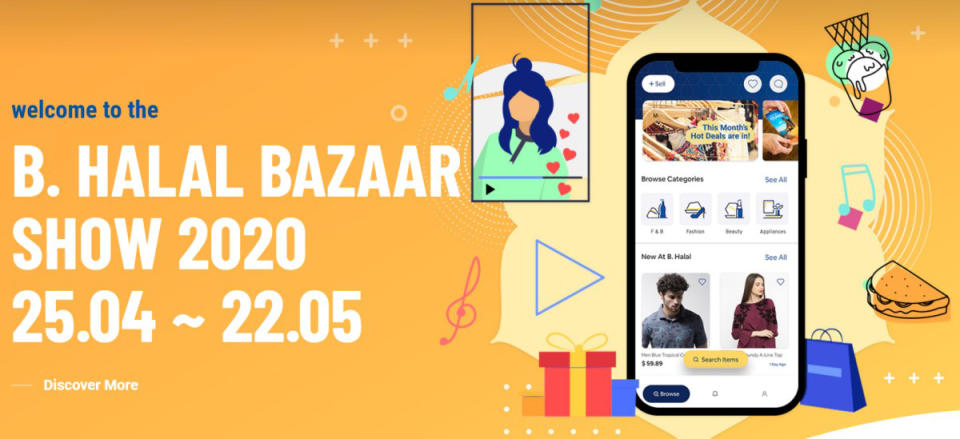How COVID-19 is redefining Ramadan bazaars in Singapore - the impact of embracing e-commerce

Once a year during Ramadan, vast swathes of spaces in the townships of Geylang Serai, Woodlands, Tampines, Bedok, and Jurong come to life with merchants peddling their wares for customers looking to spice up Hari Raya celebrations at home. For Muslims, while the bulk of the day is reserved mainly for the observance of the fast—one of the five tenets of Islam—it is at night when all across the island, Ramadan bazaars rouse to life and the air quickly fills with the colourful sights, boisterous sounds, and intoxicating smells of one of the most iconic events in the Singapore calendar.
Mustaffa Shah, founder of Enniche Events and B Halal puts it succinctly: "The Geylang Serai Ramadan Bazaar has firmly established itself at the most iconic bazaar in Singapore. In 2019, it had a footfall of over two million, unmatched by any other event in Singapore. It has also evolved from being mainly a Malay Muslim event to something the larger Singapore community looks forward to and embraces."
It was thus a bitter pill to swallow when this year, as Singapore took affirmative steps to eradicate the COVID-19 virus, the Malay/Muslim populace realised that for the first time since the history of Singapore's independence, the well-loved Ramadan bazaars islandwide will now be cancelled as it falls under the category of a mass gathering above 250 people.
READ MORE:
10 halal restaurants with islandwide delivery
Fatpapas founder Sheikh Haikel on creating an online variety show for a bazaar platform
INTERVIEW: Chef Daniel Yee of ChiChi Dining - “I’m afraid this situation might shift the mentality of dining out”
Eat healthy with these 10 Singapore restaurants that deliver wholesome grub to your front door
Where to order affordable food during Circuit Breaker, including free meals for the needy
#SupportlocalFnB when you order your takeaways or delivery from these 10 hawker stalls
Initial reactions from Ramadan bazaar organisers

For some bazaar organisers, the announcement on 20 March was something they predicted coming from a mile away as the number of COVID-19 cases in Singapore rose, and some restaurants were forced to shutter. Other dining establishments were told they could operate but had to switch to a delivery-only system.
The initial concern Haryani Binte Othman, co-founder and director of MakBesar, had was for her vendors. Some of them had already planned a whole month of business during Ramadan. "They have their supplies ready, and I worry about how they would survive, especially when most of them heavily depend on the sales they could be making during bazaars," she shared.
It is a sobering reality for merchants who are now left with one month's worth of inventory piled up at home with no physical avenues for sale. One can but only imagine the scale of stock in hand for some vendors who intended to set up shop in several bazaars, which, in a non-pandemic time, could easily number up to five.
The birth of the online Ramadan Bazaar
The solution seems simple enough—at least for merchants who are already familiar with the world of e-commerce, either as a buyer, but even more so as a seller. Having first-hand knowledge about selling goods off a digital platform removes the dreaded barrier of entry for shop owners and forces them to rethink a business strategy that could effectively replace the physicality of the traditional face-to-face transaction.
"Most have never been on an e-platform before and naturally had their reservations," Mustaffa Shah elaborated when asked about the biggest concerns merchants had about coming on-board as an e-retailer to his online marketplace, B.Halal. "Most of them are also home-based businesses who were worried they might run afoul of the law."
The biggest concerns, however, are reserved for the older and more traditional retailers of Ramadan bazaars. "We recognised from the start that they would need our support which we gave by providing free training and guidance so that they have the knowledge and confidence to conduct their transactions online," Siti Nur Ida Mohamed Ali, spokesperson for Wisma Geylang Serai and GeylangBazaar.Online shared. "Today, we are proud that some of them are closing sales online; something they could never imagine doing previously."

This fast adoption to the world of e-commerce is further helped along by organisations like Hubreno which, to date, has on-boarded 200 merchants to their platform GoBaza.SG. It is a success brought about primarily due to the ease of registration and speed of evaluating the seller's request to open a store on their platform.
For Mohammad Khairul Bin Yunos, co-founder of GoBaza.SG, the advantages of coming on-board his platform as a seller is two-fold; a free on-boarding process and the assurance that 100% of the sales commission goes to the seller.
Physical vs. online atmosphere
Part of what makes browsing and shopping at Ramadan Bazaars so special is the sensorial impact of basking in the sights and sound of a bustling marketplace. Walking down the narrow aisles of the Geylang bazaar is indeed an experience best described as the epitome of festiveness.
Noting the convivial disparity between the online and offline experience, Haryani was determined to keep the spirit of Ramadan burning bright on MakBesar.com. "Some of the initiatives we've come up with online are auctions, live sale, and entertainment acts by local artists. We've also included daily Quranic recitations in response to people who miss going to the mosque during Ramadan."
GeylangBazaar.Online is also not resting on their laurels when it comes to recreating the festive atmosphere of the Ramadan Bazaar. Efforts to rally the immediate family units together has given birth to the #Gemakeluarga challenge where participants are required to record a 1 minute video of themselves executing traditional dikir barat movements, to the tune of 'Di Pinggiran Aidilfitri' and uploading it to their Instagram accounts.

Over at B.Halal Bazaar show, sellers have been encouraged to be interactive in peddling their wares. Mustaffa Shah shares that they've seen curtain sellers explaining the materials to customers—a sales interaction usually reserved for face-to-face interaction. "So, while the public may not be able to go to the physical bazaar this year, we've brought the bazaar to them," Mustaffa said.
Bridging the divide between seller and buyer
It is commendable what has been achieved by bazaar organisers in quickly turning what could have been a stage set for financial ruin into a tweaked version of the original, albeit with some concessions made along the way.
Regardless of the approach, online selling will always lag behind the traditional iteration of the Ramadan bazaar where personal interaction reigns supreme. "There is just no substitute to experiencing good food, and good music in a wholesome atmosphere with your friends and family at the bazaar," Mustaffa offered in response.
But in the time of a pandemic such as this, it might be prudent for merchants to further equip themselves with the skills required to diversify their selling platforms especially when the government has given indications that the situation for retailers is not about to go back to status quo immediately anytime soon.
Online Ramadan bazaar as a permanent option for the foreseeable future
With a new marketplace platform under their belt, organisers are starting to realise and embrace the untapped potential e-commerce brings. With more people staying home to work throughout the rest of the year, the change in shopping habits becomes even more apparent. Retailers that don't catch up, risk being left in the dust. It is a trend bazaar organisers are watching keenly, with some seriously considering developing their e-commerce platform further beyond Ramadan.
"We've observed that our customers are watching more of our content online," Haryani shared. So, moving beyond the Ramadan period, we would definitely continue with our online platform, keeping it vibrant, fun, and most importantly, affordable for our merchants."
For Muhammed Khairul, convenience and relevancy are the two crucial factors when it comes to developing a good digital platform."GoBaza.SG may also look into developing a mobile application and further refining our marketplace so that transactions can take place within our portal itself."
Embracing the new normal of the retail space

Could this pandemic herald a new era for Ramadan bazaar merchants in Singapore? With the new normal now being social distancing and staying away from crowds, what does this mean for sellers who depend solely on direct selling to customers to earn their keeps?
Perhaps it's more useful to look at it this way. According to a 2014 study conducted by Visa Consumer Payment Attitudes, Singaporeans were found to be the top online shoppers in Southeast Asia. The study also reported that 26% of Singaporeans make an online purchase at least once a week while 58% would be making an online purchase at least once a month.
This statistic has different effects on two camps of retailers. The first camp is the new entrepreneurs who don't have to worry about the burden of rental costs to start selling their wares online. The second camp, at the other end of the spectrum, is made up of veteran sellers who might find this new way of selling quite cumbersome to adapt to.
There's also stiff competition from other more established e-commerce platforms such as Zalora, Lazada, Shoppee, and Qoo10 to worry about. The task ahead may be daunting for some of these organisers who now must find ways to differentiate their sales tactic from these bigger players and carve out a niche for themselves within the space dedicated to the Malay/Muslim community.
Challenges aside, what COVID-19 forces us to confront is the gradual blurring of the line between physical retail presence and e-commerce. The future of business is here and has, unfortunately, been thrust into the faces of merchants in the Ramadan Bazaar. If anything, the dire effects of COVID-19 have shown that even amidst a pandemic, there is still space for new and exciting innovation that will change the way businesses interact with customers. One must only have the courage and tenacity to take that first, furtive step into the unknown.
Tiding over Circuit Breaker and WFH:
Luxurious ingredients to order online to bring the restaurants to you
New to the fit life? Wear the right sports bra while embracing the fitness movement
Baking a lot? Follow these 7 essential tips for the tastiest results
10 restaurants for every occasion that deliver islandwide to wherever you are in Singapore
Streaming services to watch while staying at home to avoid the coronavirus
Our favourite Asian fitness influencers to follow for home workouts
Check how crowded malls and parks are before going outdoors at these websites


